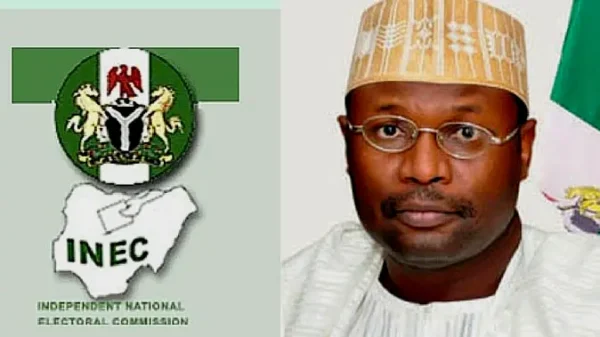
Abuja—The Independent National Electoral Commission, INEC, has given an insight into the huge logistical requirement for the conduct of next year’s general election, saying it would have to produce 430 million ballot papers for 90 million projected registered voters.
INEC Chairman, Prof. Mahmood Yakubu, disclosed this at a symposium organized by the Enough is Enough EIE group with the theme “The Electorate: A Conversation on Elections in Nigeria”, in Abuja yesterday.
According to him, with a projected voter population of 90 million, the commission will have to print 90 million ballot papers for the presidential election, the same quantities for the National Assembly (House and Senate) and same for state constituencies.
However, it would print about 70 million for the governorship election because we will only conduct the election in 28 states.
He said: “We require thousands of service providers replacing lost or damaged facilities and providing facilities that we would require for the elections.
“How many Nigerians know that for the 2023 general elections, on the basis of our projection of 90 million voters, we are going to print 90 million ballot papers for the presidential election, the same quantities for the National Assembly (House and Senate), the same quantities for state constituencies and about 70 million for the governorship elections because we will only conduct the elections in 28 states. That is 430 million ballot papers to be produced for the 2023 general elections.
“By the time you add the result sheets and other documents, we are inching close to half a billion documents to print. By the time we also talk about the continuous voter registration, there will also be millions and millions of papers that we have to produce as a legal requirement for the elections. So, the commission is grappling with that.”
He also spoke of millions of pages of the voter register that would have to be produced by the commission.
“Section 19(1) of the Electoral Act talks about publication of the register of voters nationwide not later than 90 days before the date fixed for the election.
“We have to paste the list in all the local governments and all wards of the federation. It is a huge work. If you look at the register of voters at the polling units, the register has 10 names on it.
”So, our projection is that if we have 90 million voters and each page has 10 names and the law requires that we should paste the register in all local governments and wards nationwide for claims and objections by citizens, it means that we have to print those registers physically. ”So 90 million divide by 10 will give you nine million. So, the commission will print nine million pages of the register to paste for claims and objections by the citizens and we do it as a commission.
”That is why we have giant printers in all INEC offices nationwide and that is part of the reason we have a spike in the election budget. It is a requirement of the law and we have to do it so that citizens can help us to clean up the register of voters.
”When that is done, then we have to consolidate the register -new registrants and old registrants- and produce the register of voters for the next election in 2023 and we print three copies of the register.
”One in colour at the polling units on election day and two for display. So, nine million multiplied by three is 27 million pages that INEC has to print for the elections.
“In addition to that, we have to do the de-duplication to remove the ineligible registrants from the register and then print the PVCs and make them available for collection,” he stated.
Yakubu had earlier stated that the ballot papers would be printed in Nigeria.

